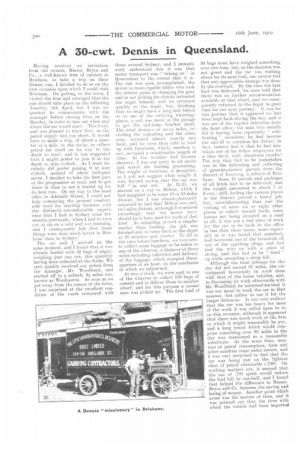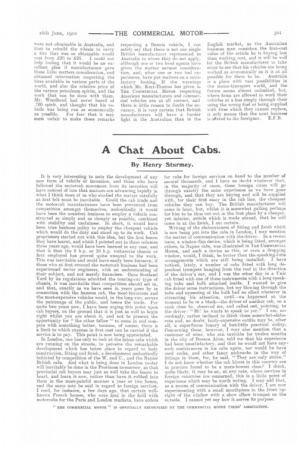A 50-cwt. Dennis in Queensland.
Page 6

Page 7

If you've noticed an error in this article please click here to report it so we can fix it.
Having received an invitation from the owners, Messrs. Bryce and Co., a well-known firm of carriers in Brisbane, to take a trip on their Dennis van, I decided to do so on the first occasion upon which I could visit Brisbane. On getting to the town, 1 visited the firm and arranged that the run should take place on the following Tuesday, 5th April, but I was requested to communicate with the manager before closing time on the Monday, in order to find out when and where the car would start. This I did. and was pleased to learn that, as tile petrol supply had run short, it would have to make a trip, of about a quarter of a mile, to the docks, to collect petrol for itself on its ‘vay to the depot to start, and it was suggested that I might prefer to join it at the depOt at nine o'clock. As I most decidedlv did prefer joining it at nine o'clnek, instead of about half-past seven, I decided to take the first part of the programme as read, and to get there in time to see it loaded up for its first run. On my way to the head office in Adelaide Street, I could not help comparing the present comfortable hour for starting business with the distinctly-uncomfortable experience that I had in Sydney some few months previously, when 1 had to turn out at six on a cold and net morning, and I consequently felt that these things were done much better in Brisbane than in Sydney!
The car and I arrived at the same moment, and I found that it was already loaded with 32 bags of sugar, weighing just one ton, this quantity having been collected at the docks. We very quickly received oar orders from the manager, Mr. Woodhead, and started off to a suburb, 3?, miles out, known as Woolloowin. As soon as we got away from the centre of the town, I was surprised at the excellent condition of the roads compared with
those around Sydney, and I immediately understood how it was that motor transport was " taking on " in Queensland to the extent that it is. The run was soon accomplished, the driver (a most-capable fellow who took the utmost pains in changing his gear and in not jerking his clutch) unloaded the sugar himself, and we returned quickly to the depot, but, thinking that we might have a long ride before Os to one of the outlying wateringplaces, a call was made at the garage to get the tail-lamp bracket fixed. The total distance or seven miles, including the unloading and the other stop, occupied aline:it exactly one hour, and we were then told to load up with furniture, which, needless to say, occupied a considerable length of time. As the weather had become showery, I was not sorry to sit inside and watch the loading proceeding.
le weight of furniture is deceptive, so I will not suggest what weight it was, beyond saying that the car was full " in and out.At 11.25, we started on it run to Milton, which I had imagined to be some 10 or 15 miles distant, but I was almost-pleasantly surprised to find that Milton was only two miles distant, although I wondered exceedingly that the motor lorry should have been used for work of that kind. As unloading preyed a simpler matter than loading, the job was finished and we were back at the depot at 20 minutes past twelve. To fill in the time before luncheon, we were sent to collect some luggage to he taken to one of the wharves, a distance of three miles including collection and delivery of the luggage, which occupied threequarters of an hour, at the conclusion of which we adjourned.
At two o'clock, we were sent to one of the wharves to collect 100 bags of cement and to deliver them to another wharf, and for this purpose a second man was picked up. The first load of
34 bags must have weighed something over two tons, but, as the distance was not great and the car was waiting about for its next load, one cannot feel that any appreciable damage was done by the overload. By the time the first load was delivered, we were told that there was no further accommodation available at that wharf, and we consequently returned to the depot in good time for our next journey. It was for this journey that it appeared we had been kept back during the day, and it was one of the regular deliveries from the head office; the man who usually did it having been repeatedly " celebrating '' occasions, he had become too unwell to continue his duties ; in fact, rumour had it that he had mistaken one of his fellow employees for a blue devil, with disastrous results! The trip that had to be undertaken was in the delivering and collecting of general-carriers' parcels from the district of Toowong, a suburb of Brisbane. Sonic 16 parcels and packages of all kinds had to be delivered, and the weight amounted to about 7 or 8 cwt.; still, finding the various places in the district proved a heavy job, but, notwithstanding that and the visiting of sonic six or eight other places to collect inward loads, some houses not being situated on a road at all, it was not a bad piece of work for the car to be back at the office in less than three hours, more especially at it was found that somebody had borrowed one of the terminals oil one of the sparking plugs, and had tied the wire on with a piece of string, and this had to be " fixed " up while ascending a steep hill.
Although the total mileage for the day did not exceed 35 miles, the car compared favourably in work done with that of the horse vehicles, and, in discussing its work afterwards with Mr. Woodhead, he informed me that it was not usual to work the car in that manner, but rather to use it for the longer distances. It was very evident I that the car was too heavy for most I of the work it was called upon to do that the car was too heavy for most I of the work it was called upon to do on this occasion, although it appeared -=-= that there was much work of the firm to which it might reasonably be put, and a long round which would comprise something over 80 miles in the day was mentioned as a reasonable substitute. At the same time, matters of petrol consumption, tires and other sundries came under review, and I was very surprised to find that the car was being run on the lightest class of petrol obtainable (.700). On working matters out, it seemed that the use of .700 spirit would reduce the fuel bill by one-half, and I found that helped the difference to Messrs. Bryce and Co. between the saving and losing of money. Another point which arose was the matter of tires, and it was pointed out that the tires with which the vehicle had been imported
were not obtainable in Australia, and that to rebuild the wheels to carry a tire that was so obtainable would cost from £20 to £25. I could not help feeling that it would be an excellent plan if manufacturers gave these little matters consideration, and obtained information respecting the tires available in various parts of the world, and also the relative price of the various petroleum spirits, and the work that can be done with them. Mr. Wooclhead had never heard of .760 spirit; and thought that his vehicle was being run as economically
as possible. For fear that it may seem unfair to make these remarks
respecting a Dennis vehicle, I can safely say that there is not one single British manufacturer represented in Australia to whom they do not apply, although one or two local agents have given the matter earnest consideration, and, after one or two bad experiences, have put matters on a satisfactory footing. If the warnings which Mr. Kerr-Thomas has given in TILE COMMERCIAL MOTOR respecting American manufacturers and commercial vehicles are at all correct; and there is little reason to doubt the accuracy, it is very certain that British manufacturers will have a harder fight in the Australian than in the English market, as this Australian business man considers the first-cost value of the article he is buying less than working cost, and it will be well for the British manufacturer to take steps to see that his vehicles are being worked as economically as it is at all
possible for them to be. Australia is a place with vast possibilities in the motor-transport world, and the future seems almost unlimited, but, where firms are allowed to work their vehicles at a lass simply through their using the wrong fuel or being supplied with tires which they cannot replace, it only means that the next business is offered to the foreigner. E.F.B.




















